|
|
 |
2nd International Forum on
Partnerships for Sustainable Development:
Advancing Implementation on Water and Energy
21-23 March, 2005 Marrakech, Morocco
|
|
|
|
|
|
IISD's SUMMARY REPORT
is available
online in the following formats:
|
|
|
Tuesday, 22 March Highlights:
Panel Session: The Partnering Process
|
| |
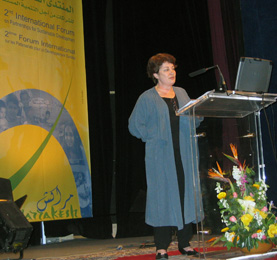 |
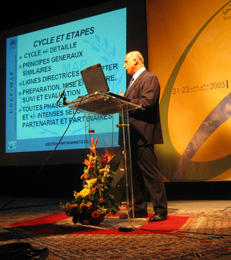 |
|
| |
|
|
| |
Ros Tennyson, International Business Leaders Forum and the Partnering Initiative, gave an overview of the partnering cycle, outlined five non-negotiable truths: partnership is about clarifying boundaries and responsibilities; it does not matter which sector triggers a partnership; individuals really matter; systems are ultimately more important than projects; and partnerships are about taking, not mitigating, risk. She proposed that partnerships are about innovation and working outside normal ways of working and described partnering as an art and a science. (for the full presentation, visit: www.thepartneringinitiative/mainpages/rp/presentations). Arab Hoballah, UNEP/MAP, discussed managing partnerships. |
|
| |
|
|
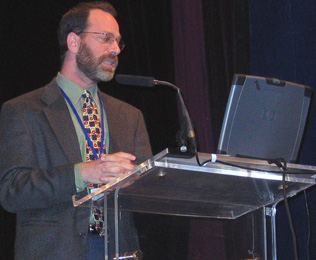 |
|
|
| |
| |
| Ken Caplan, Director, Building Partnerships for Development-Water and Sanitation, presented on Building Partnerships: Local ownership and Cross-sectoral Linkages. He noted that PPPs are distinctive in that they usually take the form of a contract between the private and public sector, with a vertical accountability structure. Other partnerships are generally less contractual and operate with more horizontal accountability. |
|
| Water Sessions |
|
|
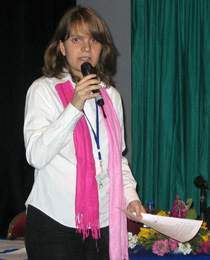 |
|
|
| |
| Aurore Maillet, EU Water Facility, EC, makes a presentation on building water partnerships: local ownership and cross-sectoral linkages |
| |
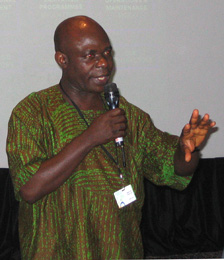 |
|
|
| |
| Johnson Klu, Regional Manager, Mvula Trust, South Africa (left) presented on a private-public-NGO partnership and programme in supporting water sanitation and integrated development in South Africa . He highlighted the program's strengths such as promoting local economic development, ensuring a central role for institutional and social development and promoting community ownership and mobilization. |
|
| |
|
|
| Energy Breakout Groups |
|
| A breakout session on managing energy partnerships was moderated by Jacob Moss, Environmental Protection Agency, US, and Arab Hoballah, UNEP/MAP.
Moss opened with some remarks on the US EPA partnerships Partnership for Clean Fuels andVehicles and the Partnership for Clean Indoor Air. He observed that both focus on the nexus of energy and health, specifically diseases arising from indoor pollution from cook-stoves and urban air pollution. |
| |
|
| |
| Jacob Moss, US Environmental Protection Agency, and Arab Hoballah, UNEP/MAP, during the Breakout session on Managnig Energy Partnerships: Internal Governance Structures |
| |
|
|
|
|
| |
| |
| |
| Arab Hoballah, Deputy Coordinator, UNEP and Mediterranean Action Plan Coordinating Unit (hoballah@unepmap.gr; www.unepmap.org; www.unepmap.gr); and Rob de Jong, Programme Officer, Urban Environment, Division of Policy Development and Law (DPDL) (rob.jong@unep.org; www.unep.org) |
|
|
Intersectoral (water and energy) Breakout Sessions: How to Find Resources (financial and non-financial):
Roundtable: Lessons learned and innovative approaches to partnership financing |
| |
|
| |
| Hans Wessels, Coordinator for WSSD follow up, DGIS, Ministry of Foreign Affairs, the Netherlands (left), and Moderator Gary Pringle, Foreign Affairs, Canada, and Aaron Salzburg, US State Department (right) |
| |
| |
|
| Jamal Saghir, Director of Water and Energy, World Bank (right) |
| |
|
| Workshop on Resource Mapping: a Practical Tool for Mobilizing a Partnership's Financial and Non-Financial Resources |
| |
|
| Workshop facilitator Ros Tennyson (above); Giuseppe Maria Sfligiotti, Director General, Observatoire Mediterraneen de l'Energie, and Ros Tennyson, Partnering Initiative, invited four ‘buzz groups' to explore challenges from the perspective of one sector: government, business, NGOs and community. In a feedback session, the ‘buzz groups' reported their discussions and conclusions. The challenges identified for NGOs were: resource issues; lack of ability to focus; coverage; action or advocacy orientation; administrative capacity and accountability; reporting and documentation; staff turnover; donor-driven priorities; competition between NGOs; aligning NGO-specific agendas with others' priorities; and an imbalance in power relations. |
| |
|
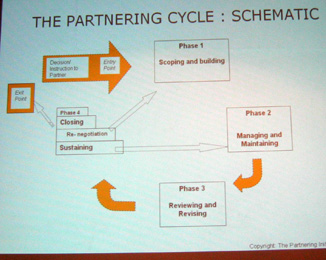 |
|
|
| |
| Workshop sponsored by the World Business Council on Sustainable Development: The Role of Business in Public-Private Partnerships |
|
|
Michael Glover, Director, Office of Environmental Policy, US Department of State (glovermp@state.gov); George Carpenter, Director, Corporate Sustainable Development, Procter & Gamble (carpenter.gd@pg.com; www.pg.com); Sarah Adams, Electricite de France (sarah.adams@edf.fr); and Jaques Labre, Suez Environnement (jacques.labre@suez-env.com) (left photo); and Pierre Victoria, Cercle Francais de L'eau (right photo front) |
|
|
|
|
| Signing of MOU between Morocco and the Japan Bank for International Cooperation (JBIC) on the CDM |
|
| |
| Taha Balafrej, Director, Deparatment of Partnerships Cooperation and Coordination, Ministry of Territorial Planning, Water and Environment, Morocco, and Motonori Tsuno, Director General, Japan Bank for International Cooperation |
|
| |
Photos from the reception dinner |
|
|
|
|
|
 |
Relevant links |
 |
|
|

© 2005,
IISD. All rights reserved.
|